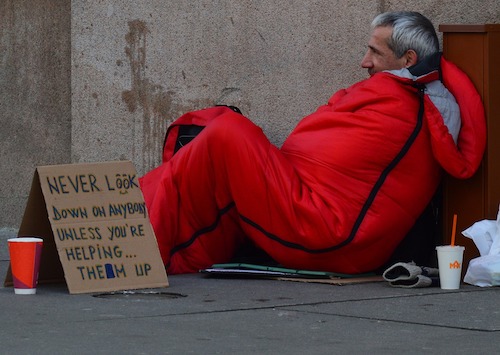After being thrown out of a Cleveland church that doubles as a homeless shelter, a vagrant used a pistol to force his way back inside. Unfortunately, the gun-wielding intruder wasn’t the biggest threat to the facility’s survival: Its own government was.
The Denison Avenue United Church of Christ began sheltering the homeless last fall, after joining forces with the Metanoia Project, a local nonprofit. When St. Malachi Catholic Church had to reduce the number of people it housed, Denison UCC accepted the people left out in the cold.
Unfortunately for the homeless, the building is zoned as a church, not a homeless shelter.
On Christmas Eve, six police officers and two Cleveland fire inspectors descended on the church. They did not come bearing gifts.
Instead, they affixed an official letter on the church door, telling the congregation there is no room at the inn.
The city’s “cease use notice” instructed the parish that, if it wished to keep helping the homeless, it had to “submit plans and permits to the City of Cleveland Division of Building and Housing to change the use of its facility” from a church to a shelter. More precisely, the church had to change its purpose from “assembly” to “temporary residential use.”
The facility would also need to add exit signs, emergency lighting, more fire extinguishers, and a sprinkler and fire alarm system to meet the city’s fire code.
Today, on Christmas Eve, Denison UCC was issued a Cease of Use notice even after Fire Chief Calvillo agreed to meet this AM as a result of yesterday’s action.
Let’s not forget that these threats arise from Councilwoman Brady’s efforts to keep homeless people out of her ward. pic.twitter.com/CIMWluJH5i
— NEOCH (@clevhomeless) December 25, 2019
The congregation immediately began adding those items in order to bring the facility up to code. Almost six-dozen people volunteered to hold fire watch, making rounds every half hour of the night.
But parishioners are not willing “to admit that we’re no longer a church,” said Pastor Nozomi Ikuta. “We’re being told to make a choice between saying we are no longer a church and selling our homeless friends down the river.”
The congregation appealed the order on December 31, citing the Religious Land Use and Institutionalized Persons Act of 2000. RLUIPA, signed by President Bill Clinton, bars local governments from placing a “substantial burden” on the freedom of religion, except to pursue a “compelling governmental interest.”
Changing the church’s zoning status “would not affect its operations as a worship space,” according to an official statement from the city. But the church’s appeal states that feeding and housing the homeless is an act of worship. After all, the Lord commands His followers “to divide your bread with the hungry and bring the homeless poor into your house” (Isaiah 58:6-7). Didn’t Jesus go about “with nowhere to lay His head” (St. Luke 9:58)?
“We’re asserting our right and obligation, really, to do what Jesus tells us to do about caring for people who are poor and in a tough spot,” said Ikuta. “I think that we’re trying to do what is in the heart and mind of God.”
To be sure, the city has an interest in assuring that no charity risks the life and limb of its recipients. However, prudence states Cleveland’s homeless face a greater risk of hypothermia than immolation.
“From November to March, Cleveland can remain below freezing all day long,” according to the weather website currentresults.com. “The city typically has 36 days a year when the temperature never rises above” freezing.
“We think that most people would agree that compared to letting people freeze to death, having residential-grade smoke detectors is a reasonable step,” said Ikuta.
Even during this year’s unseasonably warm winter, predators – animal and human – also pose a threat to the 1,727 men, women, and children that the Department of Housing and Urban Development found living on Cleveland’s streets in its annual count.
Ultimately, the city relented for this season. The community expressed its support during a raucous session of city council on January 6 – the Christian feast of Epiphany, traditionally known as the “twelfth day of Christmas.” Fire inspectors held a surprise inspection around midnight on January 7, which the church passed. In early February, the Cleveland Board of Building Standards and Building Appeals ruled that the church could continue acting as a homeless shelter until April 15, when the worst of the weather will have passed. Church officials announced that, thanks to help from local philanthropists and faithful volunteers, it will be able to present a plan for compliance by that date. And the city councilwoman said to have spearheaded the crackdown against the church’s homeless ministry, Dona Brady, resigned in late January.
All’s well that ends well, but nothing dictates that it had to conclude this way. Expanding government contracts liberty.
Everyone who loves liberty should drink in the absurdity of the situation: A local government tried to stop a church from aiding the homeless on the holiest night of the year, then demanded that it has to give up its legal designation as a church if it wants to follow Christ’s commandments.
Thankfully – with massive mobilization and media attention – sanity prevailed, as it did when their “de-escalation” tactics kept them safe from the armed homeless man who burst into their facility on February 21.
May that portend another victory in their greater David-and Goliath struggle against the government.
(Photo credit: Public domain.)

